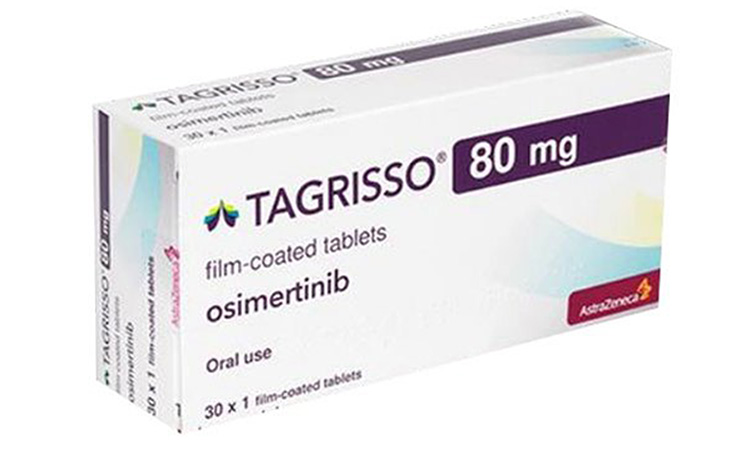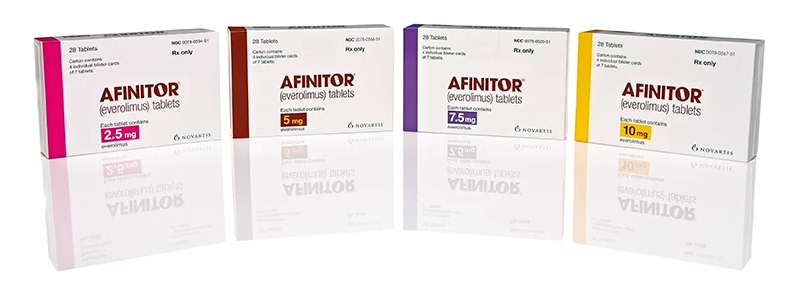Tagrisso (osimertinib) vs Afinitor (everolimus)
Tagrisso (osimertinib) vs Afinitor (everolimus)
Tagrisso (osimertinib) is a third-generation, oral, irreversible EGFR tyrosine kinase inhibitor specifically designed to treat non-small cell lung cancer (NSCLC) with certain EGFR mutations. Afinitor (everolimus), on the other hand, is an mTOR inhibitor used to treat various types of cancers, including advanced renal cell carcinoma, certain breast cancers, and neuroendocrine tumors, among others. The choice between Tagrisso and Afinitor would depend on the specific type and genetic profile of the cancer being treated; Tagrisso is specifically indicated for EGFR-mutated NSCLC, while Afinitor has a broader range of indications but is not a first-line treatment for EGFR-mutated NSCLC.
Difference between Tagrisso and Afinitor
| Metric | Tagrisso (osimertinib) | Afinitor (everolimus) |
|---|---|---|
| Generic name | Osimertinib | Everolimus |
| Indications | Non-small cell lung cancer (NSCLC) with specific EGFR mutations | Advanced hormone receptor-positive, HER2-negative breast cancer; advanced neuroendocrine tumors; renal cell carcinoma; subependymal giant cell astrocytoma (SEGA) associated with tuberous sclerosis |
| Mechanism of action | EGFR tyrosine kinase inhibitor | mTOR inhibitor |
| Brand names | Tagrisso | Afinitor, Afinitor Disperz |
| Administrative route | Oral | Oral |
| Side effects | Diarrhea, rash, dry skin, nail toxicity, stomatitis, decreased appetite | Stomatitis, infections, rash, fatigue, diarrhea, edema |
| Contraindications | Hypersensitivity to osimertinib or any excipients | Hypersensitivity to everolimus or other rapamycin derivatives, or excipients |
| Drug class | Antineoplastic agent, kinase inhibitor | Antineoplastic agent, mTOR kinase inhibitor |
| Manufacturer | AstraZeneca | Novartis Pharmaceuticals |
Efficacy
Tagrisso (Osimertinib) Efficacy in Lung Cancer
Tagrisso (osimertinib) is a third-generation, irreversible epidermal growth factor receptor tyrosine kinase inhibitor (EGFR TKI) that has shown significant efficacy in the treatment of non-small cell lung cancer (NSCLC) with specific EGFR mutations. It is particularly effective in patients with NSCLC harboring T790M mutations, which often occur as a resistance mechanism to earlier-generation EGFR TKIs. Clinical trials have demonstrated that osimertinib is effective in both first-line treatment and in patients who have developed resistance to initial EGFR TKI therapy. In the FLAURA trial, osimertinib significantly improved progression-free survival compared to standard EGFR TKIs in the first-line treatment of EGFR-mutated advanced NSCLC.
Osimertinib has also shown efficacy in treating central nervous system (CNS) metastases, a common complication in advanced NSCLC. Its ability to penetrate the blood-brain barrier allows for more effective targeting of brain metastases, which is a notable advantage over some other EGFR TKIs. This has led to improved outcomes and quality of life for patients with metastatic disease involving the CNS.
Afinitor (Everolimus) Efficacy in Lung Cancer
Afinitor (everolimus) is an mTOR inhibitor that has been studied in various types of tumors, including lung cancer. In the context of lung cancer, everolimus has been evaluated primarily in patients with advanced non-small cell lung cancer after the failure of previous chemotherapy regimens. The RADIANT-4 trial demonstrated that everolimus provided a modest increase in progression-free survival in patients with advanced, progressive, non-functional neuroendocrine tumors of lung origin, although its role in the management of typical NSCLC is limited.
Everolimus's efficacy in lung cancer is not as well established as osimertinib's, and its use is generally considered in a different context, often when other therapies have failed or in specific types of lung tumors, such as neuroendocrine tumors. The side effect profile and the specific niche it occupies in the treatment landscape for lung cancer mean that everolimus is typically not a first-line treatment for NSCLC but may be considered in certain circumstances where other therapies are not suitable or have been exhausted.
Regulatory Agency Approvals
Tagrisso
-
European Medical Agency (EMA), European Union

-
Food and Drug Administration (FDA), USA

-
Health Canada

-
Therapeutic Goods Administration (TGA), Australia

-
Medsafe (NZ)

Afinitor
-
European Medical Agency (EMA), European Union

-
Food and Drug Administration (FDA), USA

-
Health Canada

-
Pharmaceuticals and Medical Devices Agency (PMDA), Japan

-
Therapeutic Goods Administration (TGA), Australia

Access Tagrisso or Afinitor today
If Tagrisso or Afinitor are not approved or available in your country (e.g. due to supply issues), you can access them via Everyone.org.
How it works

Make an enquiry
Choose the medicine you want to buy, answer a couple of questions, and upload your prescription to speed things up. We’ll get back to you within 24 hours.


Make an enquiry
Choose the medicine you want to buy, answer a couple of questions, and upload your prescription to speed things up. We’ll get back to you within 24 hours.


Breeze through the paperwork
We'll guide you through the required documents for importing unapproved medicine, ensuring you have all the necessary information.


Get a personalized quote
We’ll prepare a quote for you, including medicine costs and any shipping, administrative, or import fees that may apply.


Receive your medicine
Accept the quote and we’ll handle the rest - sourcing and safely delivering your medicine.

Some text on this page has been automatically generated. Speak to your physician before you start a new treatment or medication.
Let's talk
If you have any questions, call us or send us a message through WhatsApp or email:
Contact us




